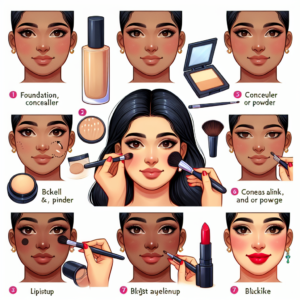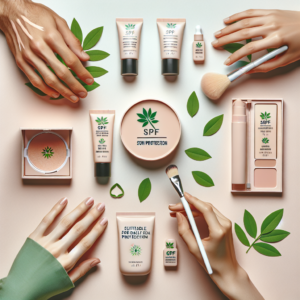Key Takeaways
- SPF in makeup is crucial for sensitive skin to protect against harmful UV rays and prevent irritation.
- Vegan makeup, often made with natural ingredients, is less likely to cause skin reactions and is better for those with sensitive skin.
- There are affordable vegan SPF makeup options that provide both protection and beauty benefits without breaking the bank.
- When choosing vegan SPF makeup, look for products without parabens, phthalates, sulfates, and synthetic fragrances.
- Understanding the labels and certifications can help you find truly hypoallergenic and cruelty-free makeup options.
Why SPF in Makeup Matters for Sensitive Skin
When it comes to sensitive skin, every ingredient matters. SPF isn’t just for beach days; it’s a daily essential that shields your skin from the sun’s damaging rays. But it’s not only about preventing sunburn. UV exposure can lead to skin irritation, exacerbate existing conditions, and accelerate aging. That’s why incorporating SPF into your makeup routine is a game-changer, especially for those of us with sensitive skin. Besides that, SPF makeup acts as a multitasker, combining protection with beautification.
Advantages of Choosing Vegan Beauty Products
Choosing vegan beauty products isn’t just a compassionate choice for animals; it’s also about being kind to your skin. Vegan makeup often skips the harsh chemicals and relies on natural ingredients that are gentler on the skin. This means less chance of irritation, inflammation, or allergic reactions. Therefore, if your skin is on the delicate side, vegan makeup with SPF is a wise choice to protect and pamper it.
Top Hypoallergenic Vegan SPF Makeup Products
Let’s dive into some of the best vegan SPF makeup products that are friendly to your wallet and your skin. These picks are chosen for their gentle formulas, positive reviews from individuals with sensitive skin, and, most importantly, their effective sun protection.
1. Daily Defense: Budget-Friendly Vegan SPF Foundations
Foundation is the cornerstone of most makeup routines, and finding one that’s vegan, SPF-infused, and budget-friendly can be a challenge. But worry not, because there are products that tick all these boxes. For example, the e.l.f. Cosmetics Flawless Finish Foundation offers a lightweight formula with broad-spectrum SPF, and it’s priced for everyday use. It’s a win-win for coverage and care.
2. Sensitive-Safe Lip Care: Vegan SPF Lip Balms and Glosses
Your lips are just as vulnerable to the sun as the rest of your face, if not more. A vegan SPF lip balm or gloss can protect this delicate area while keeping your lips hydrated and plump. Look for options like Pacifica’s Sun + Lipcare Mineral Lip Balm SPF 30, which provides moisture, shine, and full-spectrum protection at an accessible price point.
3. Gentle Glow: Vegan SPF Blush and Bronzers for Every Tone
For a touch of color that also guards against the sun, vegan SPF blushes and bronzers are the perfect addition to your makeup bag. These products are designed to give you a healthy glow while keeping your skin safe. Mineral Fusion’s Blush/Bronzer Duo not only offers sun protection but also contains antioxidants to help fight free radicals.
4. Eye Protection: Vegan SPF Eye Shadows and Mascaras
Our eyes are not only the window to the soul but also an area prone to sun damage and skin sensitivity. That’s why it’s essential to choose eye makeup that offers SPF protection. While SPF eye shadows are less common, there are vegan options available that combine skin-safe ingredients with sun care. For mascaras, Suntegrity’s Natural Mascara is a great choice as it’s formulated with minerals and without harsh chemicals, making it ideal for sensitive eyes.
Remember, the skin around your eyes is thin and requires gentle products. When you’re on the lookout for vegan SPF eye makeup, opt for those that are free from synthetic fragrances and dyes, as these are often the culprits behind irritation.
And don’t forget to pair your eye makeup with a good vegan SPF concealer, like ILIA’s True Skin Serum Concealer, which not only covers imperfections but also protects the skin from UV rays and environmental stressors.
- Choose eye makeup with mineral-based SPF for gentle protection.
- Avoid synthetic fragrances and dyes in eye makeup to reduce the risk of irritation.
- Pair your eye makeup with a vegan SPF concealer for added protection and coverage.
Finding Your Perfect Match: How to Choose Vegan SPF Makeup
Now that you’re aware of the benefits and some top picks for vegan SPF makeup, let’s talk about how to choose the right products for your sensitive skin. The key is to understand your skin’s needs and read labels carefully. Because everyone’s skin reacts differently, what works for one person may not work for another. Start by identifying your skin type and any specific concerns, such as acne, redness, or dry patches. This will guide you in selecting products that are not only protective but also nurturing.
Understanding Ingredients: What to Look for and What to Avoid
When it comes to ingredients, simpler is often better, especially for sensitive skin. Here’s a quick guide to what you should look for and what to avoid:
- Look for: Zinc oxide and titanium dioxide as sun protectants, aloe vera for soothing, and natural oils for moisture.
- Avoid: Parabens, phthalates, sulfates, and synthetic fragrances, which can be irritating and harmful to sensitive skin.
Keep an eye out for nourishing ingredients like shea butter and jojoba oil, which can help to hydrate and repair the skin. And always, always do a patch test with new products to ensure they don’t cause a reaction on your skin.
Decoding Labels: Certification and What They Mean for Sensitive Skin
Understanding the labels on your makeup is crucial. Certifications can tell you a lot about the product. For instance, a ‘Certified Vegan’ label means the product contains no animal-derived ingredients. ‘Cruelty-Free’ ensures that the product and its ingredients have not been tested on animals. And for those with sensitive skin, ‘Hypoallergenic’ suggests that the product is less likely to cause an allergic reaction.
However, it’s important to note that ‘hypoallergenic’ is not a regulated term, so it’s still essential to review the ingredients list. Certifications like ‘Non-comedogenic’ (won’t clog pores) and ‘Fragrance-Free’ (contains no synthetic fragrance) can also be beneficial for sensitive skin.
Test Before You Invest: Sampling and Patch Testing Best Practices
Before fully committing to a new makeup product, it’s wise to test it out. Many stores and brands offer samples, so take advantage of this when possible. When you get a sample, perform a patch test by applying a small amount of product to a discreet area of skin. Wait at least 24 hours to see if there’s any reaction. If there’s no irritation or discomfort, you’re likely good to go.
Here’s how to do a proper patch test:
- Apply a small amount of the product to a clean area of skin, such as the inside of your wrist or behind the ear.
- Leave the product on for at least 24 hours, avoiding washing the area if possible.
- Check for any signs of redness, itching, bumps, or swelling. If you experience any of these, it’s best to avoid the product.
If you’re not able to get a sample, you can still minimize risk by purchasing from brands with good return policies. This way, if a product doesn’t agree with your skin, you’re not stuck with it.
Skin Wellbeing: The Role of Vegan SPF Makeup in Skin Care
Integrating SPF into your makeup routine is not just about enhancing your beauty; it’s also a critical component of skin care. Vegan SPF makeup can serve as the first line of defense against the premature aging effects of sun exposure. It’s a simple step that has a profound impact on maintaining the health and vitality of your skin.
But the benefits of vegan SPF makeup go beyond just sun protection. These products are often enriched with skin-loving ingredients that provide hydration, antioxidants, and vitamins, contributing to overall skin health.
The Protection Factor: Combating Skin Damage with SPF
SPF stands for ‘Sun Protection Factor,’ and it’s a measure of how well a product will protect your skin from UVB rays, the kind that cause sunburn and contribute to skin cancer. But UVA rays are also a concern, as they penetrate deeper into the skin and can lead to premature aging. That’s why it’s important to look for ‘broad-spectrum’ on the label of your vegan SPF makeup, ensuring protection against both UVA and UVB rays.
Moreover, using SPF makeup can help prevent the exacerbation of skin conditions like rosacea and hyperpigmentation. It’s not just a summer affair; even on cloudy days or when you’re indoors, UV rays can affect your skin. So make it a daily habit, regardless of the weather or your plans.
Remember, the recommended SPF for daily use is at least 30, which blocks about 97% of UVB rays. Higher numbers do offer more protection, but no sunscreen can block 100% of UV rays, so it’s crucial to reapply every two hours when you’re out in the sun for extended periods.
Compassionate Choices: How Vegan Makeup Benefits More Than Just Skin
Opting for vegan makeup with SPF is not only beneficial for your skin but also aligns with ethical and environmental values. By choosing vegan, you’re saying no to animal testing and the use of animal-derived ingredients, which can often be obtained through harmful processes.
- Vegan makeup is cruelty-free, meaning no animals were harmed for your beauty routine.
- It often has a lower environmental impact, as plant-based ingredients typically require fewer resources to produce.
- Choosing vegan supports a more sustainable and ethical beauty industry.
It’s a small step that can make a big difference, not just for your own skin but for the well-being of animals and the planet.
FAQs
Let’s address some frequently asked questions about vegan SPF makeup. This section will help you make informed decisions and ensure that your makeup routine is as skin-friendly and effective as possible.
Can vegan makeup provide enough SPF protection?
Yes, vegan makeup can provide sufficient SPF protection. The key is to look for products labeled as ‘broad-spectrum’ and with an SPF of at least 30, which is the dermatologist-recommended level for daily use. Ingredients like zinc oxide and titanium dioxide are common in vegan formulations and are excellent for physical sun protection.
How do I know if a product is truly hypoallergenic?
While the term ‘hypoallergenic’ isn’t regulated, products labeled as such are typically formulated to minimize the risk of allergic reactions. To ensure a product is truly hypoallergenic, check for third-party certifications, read ingredient lists, and conduct a patch test before using it fully.
Here’s a quick checklist for evaluating hypoallergenic products:
- Look for certifications from reputable organizations.
- Review the ingredient list for common irritants.
- Conduct a patch test to see how your skin reacts.
Are affordable vegan makeup products eco-friendly?
Many affordable vegan makeup products are eco-friendly because they often prioritize sustainable and cruelty-free practices. However, it’s important to research each brand, as ‘vegan’ doesn’t automatically equate to ‘eco-friendly’. Look for additional information on packaging, sourcing, and the brand’s environmental policies.
What’s the difference between mineral and chemical SPF in makeup?
Mineral SPF, also known as physical sunscreen, uses ingredients like zinc oxide and titanium dioxide to reflect UV rays away from the skin. Chemical SPF, on the other hand, absorbs UV rays and converts them into heat, which is then released from the skin. Mineral SPF is generally considered better for sensitive skin because it’s less likely to cause irritation.
Can I use vegan SPF makeup if I have acne-prone skin?
Yes, you can use vegan SPF makeup even if you have acne-prone skin. Look for non-comedogenic products that won’t clog pores. Mineral-based SPF makeup is often a good choice as it sits on the surface of the skin and is less likely to cause breakouts.
Keep in mind that everyone’s skin is different, so it’s essential to pay attention to how your skin responds to new products and adjust your routine accordingly.




